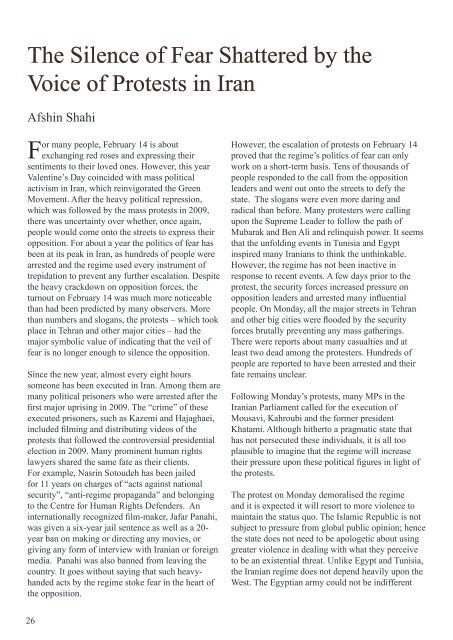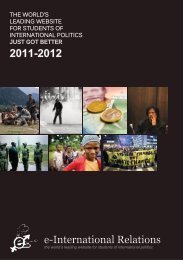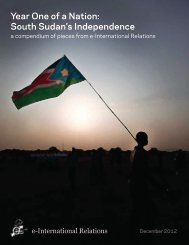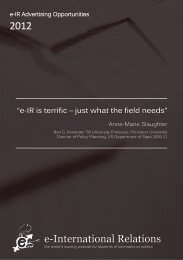The Arab Spring of Discontent - e-International Relations
The Arab Spring of Discontent - e-International Relations
The Arab Spring of Discontent - e-International Relations
You also want an ePaper? Increase the reach of your titles
YUMPU automatically turns print PDFs into web optimized ePapers that Google loves.
<strong>The</strong> Silence <strong>of</strong> Fear Shattered by the<br />
Voice <strong>of</strong> Protests in Iran<br />
Afshin Shahi<br />
For many people, February 14 is about<br />
exchanging red roses and expressing their<br />
sentiments to their loved ones. However, this year<br />
Valentine’s Day coincided with mass political<br />
activism in Iran, which reinvigorated the Green<br />
Movement. After the heavy political repression,<br />
which was followed by the mass protests in 2009,<br />
there was uncertainty over whether, once again,<br />
people would come onto the streets to express their<br />
opposition. For about a year the politics <strong>of</strong> fear has<br />
been at its peak in Iran, as hundreds <strong>of</strong> people were<br />
arrested and the regime used every instrument <strong>of</strong><br />
trepidation to prevent any further escalation. Despite<br />
the heavy crackdown on opposition forces, the<br />
turnout on February 14 was much more noticeable<br />
than had been predicted by many observers. More<br />
than numbers and slogans, the protests – which took<br />
place in Tehran and other major cities – had the<br />
major symbolic value <strong>of</strong> indicating that the veil <strong>of</strong><br />
fear is no longer enough to silence the opposition.<br />
Since the new year, almost every eight hours<br />
someone has been executed in Iran. Among them are<br />
many political prisoners who were arrested after the<br />
first major uprising in 2009. <strong>The</strong> “crime” <strong>of</strong> these<br />
executed prisoners, such as Kazemi and Hajaghaei,<br />
included filming and distributing videos <strong>of</strong> the<br />
protests that followed the controversial presidential<br />
election in 2009. Many prominent human rights<br />
lawyers shared the same fate as their clients.<br />
For example, Nasrin Sotoudeh has been jailed<br />
for 11 years on charges <strong>of</strong> “acts against national<br />
security”, “anti-regime propaganda” and belonging<br />
to the Centre for Human Rights Defenders. An<br />
internationally recognized film-maker, Jafar Panahi,<br />
was given a six-year jail sentence as well as a 20-<br />
year ban on making or directing any movies, or<br />
giving any form <strong>of</strong> interview with Iranian or foreign<br />
media. Panahi was also banned from leaving the<br />
country. It goes without saying that such heavyhanded<br />
acts by the regime stoke fear in the heart <strong>of</strong><br />
the opposition.<br />
However, the escalation <strong>of</strong> protests on February 14<br />
proved that the regime’s politics <strong>of</strong> fear can only<br />
work on a short-term basis. Tens <strong>of</strong> thousands <strong>of</strong><br />
people responded to the call from the opposition<br />
leaders and went out onto the streets to defy the<br />
state. <strong>The</strong> slogans were even more daring and<br />
radical than before. Many protesters were calling<br />
upon the Supreme Leader to follow the path <strong>of</strong><br />
Mubarak and Ben Ali and relinquish power. It seems<br />
that the unfolding events in Tunisia and Egypt<br />
inspired many Iranians to think the unthinkable.<br />
However, the regime has not been inactive in<br />
response to recent events. A few days prior to the<br />
protest, the security forces increased pressure on<br />
opposition leaders and arrested many influential<br />
people. On Monday, all the major streets in Tehran<br />
and other big cities were flooded by the security<br />
forces brutally preventing any mass gatherings.<br />
<strong>The</strong>re were reports about many casualties and at<br />
least two dead among the protesters. Hundreds <strong>of</strong><br />
people are reported to have been arrested and their<br />
fate remains unclear.<br />
Following Monday’s protests, many MPs in the<br />
Iranian Parliament called for the execution <strong>of</strong><br />
Mousavi, Kahroubi and the former president<br />
Khatami. Although hitherto a pragmatic state that<br />
has not persecuted these individuals, it is all too<br />
plausible to imagine that the regime will increase<br />
their pressure upon these political figures in light <strong>of</strong><br />
the protests.<br />
<strong>The</strong> protest on Monday demoralised the regime<br />
and it is expected it will resort to more violence to<br />
maintain the status quo. <strong>The</strong> Islamic Republic is not<br />
subject to pressure from global public opinion; hence<br />
the state does not need to be apologetic about using<br />
greater violence in dealing with what they perceive<br />
to be an existential threat. Unlike Egypt and Tunisia,<br />
the Iranian regime does not depend heavily upon the<br />
West. <strong>The</strong> Egyptian army could not be indifferent<br />
to public opinion in the US as a considerable part <strong>of</strong><br />
its budget is from the US taxpayers. While Mubarak<br />
was keen to cling on to power, the army – which<br />
was an integral part <strong>of</strong> his repressive regime – saw<br />
him as a liability to its own credibility. Tunisia is<br />
equally reliant upon the West, so the regime could<br />
not be indifferent to public opinion abroad. Although<br />
both states were repressive by definition, they had<br />
certain “vulnerabilities” that the Iranian regime does<br />
not have. Unlike Egypt and Tunisia, the Islamic<br />
Republic <strong>of</strong> Iran can afford politically to cling onto<br />
the politics <strong>of</strong> fear without much consideration for<br />
global public opinion.<br />
At this stage, the regime has no interest in<br />
compromise and political reconciliation. Hence, they<br />
will increasingly rely on the politics <strong>of</strong> the iron fist<br />
to maintain the status quo. However, the politics <strong>of</strong><br />
fear can be effective only as long as it silences the<br />
opposition and prevents social disobedience. Once<br />
a state heavily depends upon fear to maintain the<br />
status quo it becomes fragile by default, because<br />
as soon as the veil <strong>of</strong> fear is removed, its chains <strong>of</strong><br />
monopoly start to evaporate. Indeed, the protest on<br />
February 14 made the regime’s repressive policies<br />
look ineffective, and has sparked a new beginning<br />
for the Green Movement. This does not necessarily<br />
indicate that the regime is losing control, but it<br />
shows that the opposition is taking measures to<br />
overcome the climate <strong>of</strong> fear and intimidation.<br />
26 27







